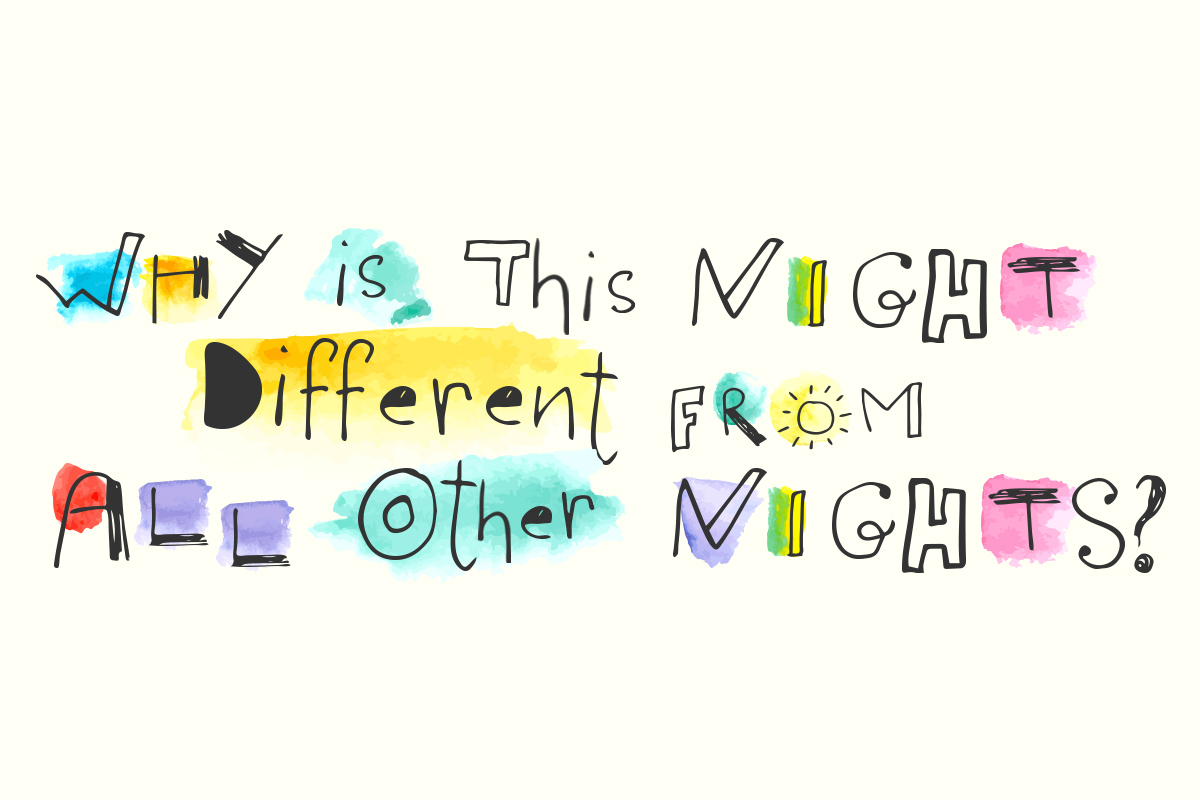How is this night different from all other nights? When I was still young enough that my hair was actually curly, when I could confidently read the Hebrew text instead of the transliteration, and when I thought my recitation of Ma Nishtana was my golden ticket to Hollywood on American Idol, I asked this question at my family’s Passover seder every year.
For the first decade or so of my life, I guarded this responsibility fiercely, taking great pride in my rendition of the Four Questions. But once other cousins entered the mix, and once my brother took over the job whenever my family would have our own seder, I was forced to remain silent while the youngest child recited the Four Questions, only joining in for the chorus of each verse.
Young me took this very personally and, for at least two cycles of not reciting the Four Questions, I hated that I was now “old.” I wanted everyone to gush over my singing voice, Hebrew-reading skills, and all around cuteness. But after a few rounds, being “old” grew on me (get it?). I liked being the experienced cousin — able to understand and almost contribute to the heated political discussions, drinking water out of the wine glass, and sitting in the coveted mahogany chair instead of the folding one I was normally relegated to.
It’s strange, then, or maybe it’s perfectly sensible, that after a year of college and independence that ended with me back in my middle school bedroom — a year characterized by a loss of control and overwhelming helplessness (amongst many other horrible, horrible things) in which I spent the better half of the year emotionally regressing to my childhood self — I will have physically become the youngest once again.
This year, I’ll be the one reciting the Four Questions. And I’ll be doing it at an in-person seder with my college quarantine pod.
The last true “normal” in-person interaction that I had was a Purim celebration with a friend’s family last year, during what I thought to be spring break. I flew home right after and, just days later, lockdown began. Zoom Passover shortly followed, and then Zoom Rosh Hashanah, Zoom Yom Kippur, Zoom Hanukkah, etc. When I said “next year in person” at the last seder, I was half-joking. But just a few months ago, I fully expected another round of Zoom holidays in my future.
I’ve gotten weirdly used to the virtual format. It has been nice to be able to connect with family members from both my mom and dad’s sides — in pre-COVID times, we would only be celebrating with one. And, at times, it has been nice to skip the small talk and get right to the singing (and, more importantly, the eating). I feel as if I’ve forgotten how to celebrate in person, without the option to mute myself while gossiping to my mom about a relative or turning my video off while answering text messages.
I’m anxious, too. The pandemic isn’t nearly over, but with the exponentially increasing rate of vaccinations, it feels like a corner has turned. In a way, the upcoming seders feel like a rehearsal for a normalcy that I’m both completely ready for and also terrified to enter.
Over the past year, I’ve gone back in time. My Spotify playlists resemble those of my early high school days (and sometimes even older — “Crush” by David Archuleta has made a reappearance). I take job interviews from a bedroom with a giant poster of my childhood golden retriever when she was still a puppy. I’ve begun requesting Fig Newtons and yogurt cups — my middle school snack — whenever my family makes a Costco run. And, although there’s a proliferation of new Netflix shows, I’ve begun rewatching Grey’s Anatomy for the I’m-not-even-sure-number of time.
I’m in this weird middle-ground now, where I feel emotionally younger and am physically the youngest of my pod, but also on the cusp of a major lifestyle change, after which I enivision my age will skyrocket yet again.
So, starting the evening of March 27, I’ll begin what feels like this next chapter of my life. One in which I sing next to people, in which I bash my friends with lettuce during Dayenu (one of my favorite Sephardic traditions), in which I share food, and, most importantly, in which I do so as a living, breathing body — not a square on a screen.
When it’s time for the Four Questions and I ask my friends, “How is this night different from all other nights?” the answer will be more than the fact that it’s the holiday of Passover, when we eat only matzah and bitter herbs, when we dip our food twice, when we recline. The answer will also be that I am celebrating with my friends, without the aid of technology. That I can give hugs and sing joyfully and celebrate without fear that my actions will lead to the death of another. That this night will hopefully be the beginning of nights to follow, nights that are wholly unremarkable but also unheard of exactly one year ago.
So here’s to me reciting the Four Questions, here’s to a Passover that starts to return to some normalcy, and here’s to next year in person, when I will hopefully be sitting on the sidelines as a younger relative, once again, recites Ma Nishtana instead of me.



